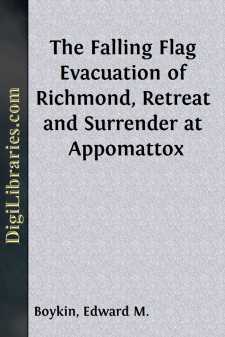Categories
- Antiques & Collectibles 13
- Architecture 36
- Art 48
- Bibles 22
- Biography & Autobiography 813
- Body, Mind & Spirit 142
- Business & Economics 28
- Children's Books 15
- Children's Fiction 12
- Computers 4
- Cooking 94
- Crafts & Hobbies 4
- Drama 346
- Education 46
- Family & Relationships 57
- Fiction 11828
- Games 19
- Gardening 17
- Health & Fitness 34
- History 1377
- House & Home 1
- Humor 147
- Juvenile Fiction 1873
- Juvenile Nonfiction 202
- Language Arts & Disciplines 88
- Law 16
- Literary Collections 686
- Literary Criticism 179
- Mathematics 13
- Medical 41
- Music 40
- Nature 179
- Non-Classifiable 1768
- Performing Arts 7
- Periodicals 1453
- Philosophy 64
- Photography 2
- Poetry 896
- Political Science 203
- Psychology 42
- Reference 154
- Religion 513
- Science 126
- Self-Help 84
- Social Science 81
- Sports & Recreation 34
- Study Aids 3
- Technology & Engineering 59
- Transportation 23
- Travel 463
- True Crime 29
The Falling Flag Evacuation of Richmond, Retreat and Surrender at Appomattox
by: Edward M. Boykin
Description:
Excerpt
EVACUATION OF RICHMOND, 1865.
On Saturday, the 1st day of April, 1865, orders reached us at camp headquarters of the Seventh South Carolina Cavalry, Gary's Brigade, to send forward all the dismounted men of the regiment to report to Lt. Col. Barham, Twenty-fourth Regiment Virginia Cavalry, in command of dismounted men of the brigade, for duty on the lines. Began to think that a move was intended of some sort, but on the brink, as all knew and felt for some time, of great events, it was difficult to say what was expected. On Sunday, the 2d, about mid-day, orders came for the wagon train of the brigade, spare horses, baggage of all sorts, that was to go at all—the greater part was to be left—to move into Richmond at once, and fall into the general train of the army of the north bank of the James River. Richmond then was to be evacuated, so all felt, though no public statement of the fact had been made; heavy fighting had been going on during the day, in the neighborhood of Petersburg, but there had been one unceasing roar of battle around us for months, and no particular account was taken of that.
The brigade was ordered to move after nightfall from its position (our winter quarters) between the Williamsburg and the "Nine Mile" road, about four miles from Richmond, and immediately behind the outer line of works on the edge of the battle field of the "Seven Pines."
We moved after dark—the Seventh South Carolina, Col. Haskell; the Hampton Legion, South Carolina, Lieut. Col. Arnold; the Twenty-fourth Virginia, Col. Robbins, and a small party of the Seventh Georgia, part of a company only—Gen. Gary commanding the brigade.
The Seventh Georgia were, with the exception spoken of, dismounted, though belonging to our brigade. We halted on the Charles City road, found all the infantry gone; Gen. Longstreet, who commanded on the north bank, had been withdrawn with Gen. Field's Division across the river, to reinforce Gen. Lee around Petersburg, some two or three days before, leaving only the Division of Gen. Kershaw in our immediate neighborhood, and Gen. Custis Lee in command of the Marine Brigade and City Reserves, next the river, near Fort Gilmer, all under the command of Lt. Gen. Ewell; also Hankin's Battery, Virginia, attached to our brigade.
We were to wait until two o'clock, and as soon as our dismounted men, who were filling the place of infantry pickets withdrawn, should come in, we were to move on to the city, acting as "rear guard," and burn Mayo's Bridge. It was all out now; there had been a heavy fight in the morning, near Petersburg, Gen. Lee all but overwhelmed, Gen. A.P. Hill killed, and the army in full retreat on Burkville, to effect, if possible, a junction with Gen. Johnston, in North Carolina.
We built big fires of brush wood, to give light and warmth, and deceive the enemy. It was cold, though in April; the men, as usual, light-hearted and cheerful round the fires, though an empire was passing away around them; some, with an innate consciousness of the work before them, when they heard that the halt was to be for two or three hours, wrapped in their overcoats, with the capes drawn over their heads, were soon sound asleep, forgetting the defeat of armies, the work of yesterday, the toil and danger of to-morrow, in some quiet dream of a home perhaps never seen again....


